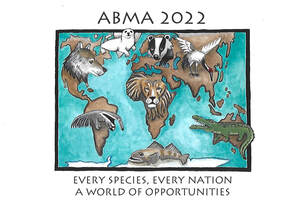Wednesday Abstracts
Wednesday Videos (Requires login)
Featured Speaker
Sabrina Brando
Take Care to Give Care
will publish PDFs of presentation soon
Live Animal Demonstration
Jerusalem Zoo
Elly Neumann
Wednesday Papers
It's the Little Things,
|
The Reptile Revolution: Embracing Reptiles in the Melbourne Zoo Training PhilosophyBianca Papadopoulos and Raelene Hobbs
Melbourne Zoo Full Abstract
Historically, training reptiles has not been a high priority in the zoo industry. They were commonly thought to be poor learners. Often, husbandry practices, like transporting of animals and veterinary procedures, were done under manual restraint. Recently, with more interest in incorporating the science of behaviour change into reptile training programs, reptiles are included in zoo-wide training programs. The ectotherm team at Melbourne Zoo have worked very hard to empower the reptiles to use their behaviour to be active participants in their own care. Through arranging antecedents, high rates of reinforcement and ensuring the trainers adjust their behaviour dynamically, based on the animal’s responses, a great deal of progress and welfare improvements have been made. This presentation will explore the evolution of reptile training at the zoo and showcase a few examples in the program including a Rhinoceros Iguana (Cyclura cornuta) scale, recall, crating and nail trim behaviours. A Philippines Crocodile (Crocodylus mindorensis) target, recall and crating behaviours and the Aldabra Giant Tortoises (Aldabrachelys gigantea) scale and blood draw behaviours. |
Live Animal Demonstration
Turtle Bay Exploration Park
Sharon Clay
Fox, Raven, Raccoon and Desert Tortoise
Featured Speaker
The Plight of the Koalas in the Greater Blue Mountains
Jen Tobey
SDZWA
Jen Tobey
SDZWA
San Diego Zoo Wildlife Alliance has been working with Science for Wildlife in Australia since 2014 examining the behavior and ecology of koalas in the Greater Blue Mountain Region. Unfortunately, in the summer of 2019/20 this area was greatly impacted by bushfires. After dealing with the immediate emergency issues from the fires, such as supplying local wildlife with food and water, attending burned animals, as well as a rescue mission of 12 koalas; research began on assessing the long-term effects these fires had on the koalas. Utilizing all resources available to them, teams have been going out and surveying the five primary sites that are part of this project for the past 7 years. This research is being done with the help of koala poop sniffing dogs, sound recorders and citizen scientists so that the plight of the koalas in this region can be documented. Over 400 surveys have been completed so far and this along with camera trap photos and sound recordings will start to paint a picture of what the recovery of both the koalas and the forest they live in looks like for the future of this iconic species that continues to face pressures from climate change.

